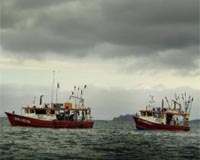 |
Buenos Aires (UPI) May 20, 2010 Argentina risks losing about half its export market for hake because of crisis conditions in the fishing industry caused by overfishing, low yields and tougher EU rules. This week the government imposed what it called a "biological shutdown" -- preventing fishing crews from leaving the ports. Analysts said the ban would be difficult to implement over the long term, amid signs that previous fishing-free days were flouted with impunity by some groups. Fisheries and Aquaculture officials said the hake catch between January and March was 33.5 percent less than the same period in 2009. Shipowners who faced criticism for overfishing hake came back into the news this week, complaining that the worst hake yields since 1992 would hurt their industry. The Wildlife Foundation of Argentina already has called the situation one of the severest crises on record. It condemned the capture of juvenile hake in what industry observers said was a continuing saga of unscrupulous practices in the sector. Falling yields have raised concerns the fishing industry could soon be appealing for urgent government help as the problem worsened. A solution would not be easy, analysts said. The practice of overfishing and not sparing juvenile fish from the catches was so widespread that it would be a long time before the stock could be restored to normal. The National Institute for Fisheries Research and Development said preliminary research into hake juveniles in the San Jorge Gulf in southern Patagonia was negative. Compounding the problem is the failure of fishing vessels to adopt and use a selectivity device that prevents the capture of juveniles, said the institute. "Besides selectivity, extending the present areas of the ban must be considered for the protection of reproduction and the young," the Hake Monitoring Commission said. Further problems for Argentina's hake industry have built up with the European Union's tougher new requirements for fish and shellfish imports. The Wildlife Foundation said a step forward would be for the fishing industry to start using devices that would prevent juvenile capture and also cut fishing by a third. Hake yields worldwide are experiencing problems because of overfishing. Norberto Yauhar, head of the Argentine fisheries and aquaculture office, said the government was actively considering extending the period that fishing vessels remained in port. Currently the fresh fish vessels are obliged to remain in port 50 days in the year, and freezer vessels for 75 days. Periods can be split up for both categories. Yauhar said the low yield could also be due to climate and water temperature changes.
Share This Article With Planet Earth
Related Links Farming Today - Suppliers and Technology
 US bans more Gulf fishing as oil fears grow for Florida
US bans more Gulf fishing as oil fears grow for FloridaNew Orleans, Louisiana (AFP) May 19, 2010 A large swathe of the Gulf of Mexico remained closed to fishing Wednesday as fears that a giant oil slick could hit Florida's beaches and corals reefs overshadowed progress in stemming the spill. The closure, which affected some 45,728 square miles (118,430 square kilometers) - around 19 percent of the Gulf's federal waters, was announced Tuesday as politicians in Washington raged over the ... read more |
|
| The content herein, unless otherwise known to be public domain, are Copyright 1995-2010 - SpaceDaily. AFP and UPI Wire Stories are copyright Agence France-Presse and United Press International. ESA Portal Reports are copyright European Space Agency. All NASA sourced material is public domain. Additional copyrights may apply in whole or part to other bona fide parties. Advertising does not imply endorsement,agreement or approval of any opinions, statements or information provided by SpaceDaily on any Web page published or hosted by SpaceDaily. Privacy Statement |